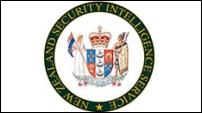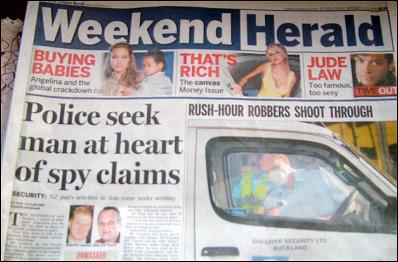Secret Source Wars A Diversion From Main Agenda
Secret Intelligence Source Wars A Diversion From Main Agenda
By Selwyn Manning – Scoop Co-Editor
 A stinging attack
against two men by the New Zealand Herald is a diversion
from the real issue beneath the Operation Leaf expose and
appears to be motivated by the Herald attempting to present
a ‘who has the best contacts’ parody.
A stinging attack
against two men by the New Zealand Herald is a diversion
from the real issue beneath the Operation Leaf expose and
appears to be motivated by the Herald attempting to present
a ‘who has the best contacts’ parody.
Today (Saturday November 27) the Herald published a smear campaign against two individuals based in Asia – hinting that their activities were a concern to New Zealand Police. That claim would appear to be exaggerated.
Scoop must add that it is mere speculation, as far as this news organisation is concerned, that the two named men are key sources in the Operation Leaf investigation.
The Herald claimed New Zealanders: “Jack Sanders, 40, and Gerald Thorns, 50, are wanted by authorities on a different matter to the bugging allegations. The police interest relates to their activities in Southeast Asia.”
Yesterday (Friday November 26) Scoop was made aware of the Herald inquiries and made contact with the New Zealand Police’s South East Asian attaché detective inspector Mike Bush who admitted he had never met the two men, but “would very much like to talk with them”.
Detective inspector Bush played down suggestions emerging from the Herald that the two men were wanted.
Bush said he “had no information” that would lead one to believe criminal activity had taken place. He said New Zealand Police did not have an investigation into the men’s activities in train, nor was there a warrant for their arrest, nor attempts to have them brought back to New Zealand.
Mike Bush said however, “unofficially” he had “an opinion as an individual”, not as a Police officer, that he would like to question their motives for setting up Global PAC. Bush suggested their motivations may be “dubious”.
When asked how he would rate the two men’s credibility, Bush said he would personally rate both on a scale of 0-10 at zero. (This was the same line Police Minister George Hawkins used earlier this week when asked how he would rate one of the men identified in the Herald considering he had association with him in the 1990s.)
Scoop asked Mike Bush what information would lead him to believe the two men had “zero credibility” considering he had never met the two men, Bush said that information was subject to privacy issues.
When asked what information he might have on the background of the two men, Bush said that too was subject to privacy issues.
When asked what other activity the two may be involved with behind Global PAC (should Global PAC be a front NGO), Bush said considering the nature of issues back home in New Zealand it would be best for “other agencies to answer that question”.
He said as a Police officer he is not able to expand on the matter any further, and indicated that there would be pressure from his superiors should he do so.

SIS Investigation: Herald Smear Campaign Diversion From National Interest Issue
Scoop has made contact with one of the individuals the New Zealand Herald targeted: Gerald Thorns issued Scoop with the following statement: “The smear campaign is designed to weaken resolve. People are being persecuted in order to shift the attention from the real issue. Now the SIS has sent someone to Bangkok and there has been contact with other agencies. The situation is being made difficult for everyone.
“This episode is a great test of how politics work in our country. This is also a test for the media. We see here a fascinating and ugly development in the politics of annihilation.
“Some journalists are willing protectors of the establishment. To their credit, some news organizations have run reports exposing this operation and the subsequent Government spin machine. But the tidal wave of carefully selected sound-bites from people like Mike Bush, for which papers make thousands of extra dollars from, is overwhelming most of the people bravely standing strong against the abusive establishment.
“I am not a paedophile and I can look myself in the eye anytime.”
Scoop also understands the Herald On Sunday newspaper has been issued a response from the other man, Jack Sanders, targeted by the Saturday Herald’s lead story. Both men deny they have been involved in any illegal activity.
 The newspaper wars are a
diversion – whether calculated and spun or simply a squabble
between two major newspapers for credibility and ratings
supremacy - it makes a parody of mainstream investigation.
The Herald appears sidetracked by contact-ego rather than
following the lines of this investigation so as to ascertain
what the real issue is about.
The newspaper wars are a
diversion – whether calculated and spun or simply a squabble
between two major newspapers for credibility and ratings
supremacy - it makes a parody of mainstream investigation.
The Herald appears sidetracked by contact-ego rather than
following the lines of this investigation so as to ascertain
what the real issue is about.
The real issue is whether the Security Intelligence Service is fragmented and whether an internal power struggle within the SIS is eroding public confidence and whether this erodes its ability to function professionally and effectively in protecting New Zealand’s national interest.
Earlier this week Scoop published a further instalment in this series titled SIS Spy Operation Broader Than Just Politics
In this article Scoop reported: There appears to be disquiet that a fracture within the SIS’s own networks is imminent. Contact ‘A’: “First of all I can see that the PM may have a deniable stance on this (Operation Leaf) but the Director (Richard Woods) did know of Leaf. I am sure of that. He will try his best to keep his knowledge of Leaf deniable but I doubt he can do that credibly for long.”Scoop has become aware of entrenched dissatisfaction among officers, operatives, and others connected to SIS networks. It appears a faction exists that has lost confidence in the director, Richard Woods. Certainly, some contacts are highly critical of Woods’ handling of foreign intelligence, and his reliance and “un-vetted acceptance” of information provided by other nations in the western alliance.
The criticisms appear consistent with a desire by some advocating reform of the SIS – which would see the service’s structure divided into a domestic wing and an external foreign agency, attracting more exposure to appraisal via departmental inspection and Parliamentary accountability.
In these times where intelligence agencies worldwide have been subjected to intensified scrutiny and governmental criticism, New Zealand’s SIS has remained cocooned from inquiry or critique.
The question remains, are times about to change?
In layperson’s terms a major function of the SIS is to ensure activities of groups and individuals do not pose a danger to the government of New Zealand.
For example, Scoop was aware of a covert operation where a Wellington based central-Asian community was monitored by SIS officers. The operation continued from late 2000 to early 2001 and involved co-operation from staff at a suburban branch of New Zealand Post. An SIS officer was assigned to handle the branch’s staff ensuring all letters and postal correspondence addressed to certain PO Box numbers was held back and examined by SIS agents before being deposited into clients’ respective inboxes. Scoop could identify the branch but believes this would needlessly expose staff. However, this reference provides enough detail to assure officials of the validity of Scoop’s sources.
Central to this investigation into the SIS is whether Operation Leaf did initiate surveillance of Maori groups, associations, networks and individuals, and indeed whether politically motivated groups, MPs came under Operation Leaf’s brief.
Scoop understands Operation Leaf morphed from the handle Operation Maple Leaf and was sparked after the Canadian SIS sought the assistance of its New Zealand counterpart in “mapping” contacts and associates of a respected Maori academic employed as an associate professor at a Canadian university.
The Canadian SIS was interested in the associate professor’s activities, particularly his views on neoconservative economics, free trade agreements and the Multilateral Agreement on Investment (MAI).
Scoop has made contact with the associate professor who confirms that he has been under surveillance. Scoop will withhold his name due to sensitivities surrounding his appointment at the university in Canada.
The associate professor explains: “In the 1990s, particularly in the second half, I was very politically active at various times- on behalf of my iwi, Waitaha, especially in relation to supporting our exclusion from the Ngai Tahu settlement, also in voicing – and writing – opposition to the Multilateral Agreement in Investment, for which I was very instrumental in reminding MFAT of their obligation to consult with Maori.
“I… also articulated strong concerns re the impact of APEC agreements and trade liberalisation on Maori, including the sale land and resources to overseas investors, etc. I had been in Canada during the APEC meeting and was an invited guest at the Alternative APEC conference. At the time I had had a U.S. State Dept representative escorted out of the building our conference was in as he attempted to attend a closed session on the MAI.
“My home had been broken into on more than one occasion, and on the second occasion, my computer and backup disks had been carefully removed. I say carefully, because there was clear evidence of someone having set up the scene to look as though it had been burgled. In my bedroom there were clothes on the floor, all my drawers were open, the mattress was askew, my wardrobe was ajar, and the little containers on my drawers were all open.
“It was not until I had called the police - who didn’t want to come out until the next day but that's another story - they DID come as I can be very persuasive! -and then began the process of tidying up that I realised that whoever had done it had taken huge care with my things. Nothing, but nothing had been gone through.
“Two piles of clothes had been carefully lifted out of a drawer and dropped on the floor. My jewellery had not been disturbed, despite the lids being opened. Nothing had been disturbed. In my study from where my computer had been removed, photos and things which could not have helped but be knocked over when they removed everything, had been carefully put back in their place, and other such measures. I knew, as I stood and studied it all, that whoever had done this, had done this reluctantly.
“They had gone to great pains to both do as they had obviously been instructed, ie to make it look as though this was an ordinary burglary, and at the same time, had treated my belongings with absolute respect. I knew with all my being that it had been done with sorrow, if that was possible.
“Such a paradox. I had been very active politically, treaty settlements, the MAI, Canada, and so forth. I was associating with pan-Maori organisations - partly because of my doctoral research, partly because I was there for my people, partly because I was concerned both for our country and for the situation of Maori. In the case of one organisation, I was there to protect, as far as possible, my people from someone whom I saw as a charlatan. So there were perhaps lots of reasons why the govt might decide to spy on me - particularly under the terms of the various amendments to the SIS Act.
“Nonetheless I decided at that time and since, that I could not and would not, let my life be governed by fear of what might happen, nor would I buy into having to be careful of what I said, or wrote or did. Because I think there are things that are far more important. And they include at the top of the list, the right to freedom of speech, the absolute necessity to defend truth and justice, and the equally urgent necessity if working towards change. And I believe so still.”
Certainly, the CSIS has been aggressive in its pursuit of anti-free trade activists. Prior to APEC meetings in Auckland in 1999, Scoop uncovered detail of how the CSIS had detained a key activist without charge or reason prior to the Vancouver APEC meetings in 1997. See… Exclusive Inside APEC - Canada's "Highest Threat"
Jaggi Singh, a Canadian activist was kidnapped days before the 1997 APEC summit, and was only released once the international talk-fest had concluded. Scoop’s article detailed how Singh was considered “Canada’s Highest Threat”. Others too came under the CSIS eye. Academics like Jonathan Oppenheim attracted the weight of Canadian spooks not due to terrorist concerns but due to his views on the failures of neoconservative economic theory.
And here in New Zealand, anti-FTA campaigner Aziz Choudry had his home ransacked by New Zealand SIS, not because they believed him to be a terrorist danger, but because of his views, thoughts, and academic associations that polarised debate surrounding free trade, GATT, MAI, and promoted a view that neoconservative ideologies eroded the social fabric of first and third world communities. See Scoop Exclusive - The Man Who Spooked The Spooks
Evidence is mounting that suggests the Canadians wanted a complete background on the Maori associate professor’s networks and associates back in New Zealand.
 Is SIS director Richard Woods functioning
effectively in his responsibilities to ensure the SIS is
serving New Zealand’s national interest? And is he able to
assure the New Zealand public that it ought to have
confidence in him and his Service?
Is SIS director Richard Woods functioning
effectively in his responsibilities to ensure the SIS is
serving New Zealand’s national interest? And is he able to
assure the New Zealand public that it ought to have
confidence in him and his Service?
Scoop contacts claim the New Zealand SIS agreed and named the investigation Operation Maple Leaf – the word Maple was soon dropped to ensure the origin of the foreign agency would be protected.
Should this be so it goes a long way toward explaining why Prime Ministerial warrants were possibly not acquired for surveillance on New Zealand citizens during Operation Leaf.
Paul Buchanan, director of the working group on alternative security perspectives at the University of Auckland, and is currently a visiting fellow at the Institute of Strategic and International Studies in Lisbon, Portugal.
Paul Buchanan states that under the SIS charter surveillance of Maori groups, even those politicised, would be legal and that the SIS would not have to inform the PM or anyone else about its activities.
This, Buchanan said when considering whether Operation Leaf was possibly a foreign intelligence liaison request.
“Given the broad definition of threats in the SIS charter, the whole op could well be perfectly legal. In that regard it is the SIS charter and lack of oversight that are the problem, not some purportedly ‘rogue’ agents,” Paul Buchanan said.
Key to this aspect would be the External Assessments Bureau or EAB - a New Zealand intelligence policy group positioned under the Department of Prime Minister and Cabinet and led by David Kersey a former NZ ambassador to the Hanoi embassy in Viet Nam.
As the agency of last recourse where all foreign-related intelligence policy decisions are either made or vetted, if a Canadian intelligence liaison request to monitor New Zealand Maori activists was made, it would have to pass through the EAB (even if the initial request was received by the SIS).
Buchanan: “That is because the SIS and its Director do not make intelligence policy decisions (i.e. how to use intelligence flows), but instead implement the operational requirements of such decisions as formulated in the EAB.”
Since the EAB is part of the Prime Minister's department (DPMC), that would mean balancing the prohibition against domestic spying on ‘normal’ political dissent against the weight of the Canadian's request in terms of continuing good relations between NZ and Canada as intelligence liaison partners.
“And there again, as in the Zaoui case, the issue of New Zealand's international reputation in the security field comes to the fore, as opposed to the clear threat to national security that the SIS is supposedly directed to use as its first priority when addressing such requests,” Paul Buchanan said.
Of course these aspects of this investigation will likely be examined by the Inspector General of Intelligence and Security Paul Neazor.
Buchanan fears given Justice Neazor’s most recent public comments regarding how he is going to handle the case worthy examination of how the SIS is operating will be avoided.
“I fear that the IG may be about to engage in an elaborate attempt to protect the government's reputation by allocating blame relatively low in the chain of command, making it seem like an unauthorised operation conducted by a few loose cannons. In that regard it would parallel the Abu Ghraib prisoner abuse investigation, by allocating blame on those at the bottom of the chain of command and denying involvement of those who usually give the orders,” Buchanan said.
Clearly the Inspector General must balance his own reputation for integrity with the pressures that may be exerted on him to protect the government and/or the SIS leadership.
The Inspector General of Intelligence and Securities Act – section 4 states:
“The object of this Act is to provide for the appointment of an Inspector-General who will assist each Minister who is responsible for an intelligence and security agency in the oversight and review of that intelligence and security agency and who will, in particular,—(a) Assist the Minister to ensure that the activities of that intelligence and security agency comply with the law; and (b) Ensure that complaints relating to that intelligence and security agency are independently investigated.
Paul Buchanan said: “In that light it might be good for the whistle-blowers to front up behind closed doors to the IG (in a secure classified hearing), because that way they reduce the amount of "wiggle room" available to the IG to pass on blame to where it does not rightfully belong.
“I would imagine that their SIS careers are over anyway, so the whistle-blowers can ensure accountability or at least lessen the chance of a whitewash by doing so. After all, if the results of the investigation do not coincide with what they revealed, they could always go public and further drag the SIS into the light of public scrutiny.”
For More see…


 Ramzy Baroud: Gaza's 'Humanitarian' Façade - A Deceptive Ploy Unravels
Ramzy Baroud: Gaza's 'Humanitarian' Façade - A Deceptive Ploy Unravels Keith Rankin: Remembering New Zealand's Missing Tragedy
Keith Rankin: Remembering New Zealand's Missing Tragedy Gordon Campbell: On Why The Regulatory Standards Bill Should Be Dumped
Gordon Campbell: On Why The Regulatory Standards Bill Should Be Dumped Martin LeFevre - Meditations: Psychedelics, Mystical Experiencing, And Organized Religion
Martin LeFevre - Meditations: Psychedelics, Mystical Experiencing, And Organized Religion Keith Rankin: Equity Rights - UBI, SUI, BUI, HUI, Or GUI?
Keith Rankin: Equity Rights - UBI, SUI, BUI, HUI, Or GUI? Binoy Kampmark: The Inevitable Souring - Elon Musk Falls Out With Donald Trump
Binoy Kampmark: The Inevitable Souring - Elon Musk Falls Out With Donald Trump